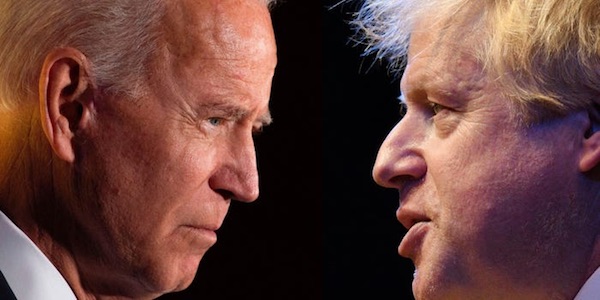
US President-elect Joe Biden has again spoken out against the prospect of a remilitarised border through Ireland and Britain’s moves to violate the Good Friday Agreement and international law.
In his first comments on Brexit since winning the US presidential election, Mr Biden said he had discussed the issue with Taoiseach Micheal Martin, British prime minister Boris Johnson and French leader Emmanuel Macron.
Speaking to reporters near his home in Delaware, he said: “We do not want a guarded border. We want to make sure - we’ve worked too long to get Ireland worked out, and I talked with the British prime minister, I talked with the Taoiseach, I talked with others, I talked to the French.
“The idea of having a border north and south once again being closed is just not right, we’ve just got to keep the border open.”
One of Mr Biden’s first phone calls to other world leaders as President-elect was to Boris Johnson, warning him that Brexit must not jeopardise moves towards peace in Ireland.
Mr Biden also touched upon the 1998 Good Friday agreement during his presidential campaign, tweeting in September: “Any trade deal between the US and UK must be contingent upon respect for the Agreement and preventing the return of a hard border. Period.”
Antony Blinken, Mr Biden’s recently appointed incoming Secretary of State, has also previously spoken out about the issue. “Joe Biden is committed to preserving hard-earned peace and stability in north of Ireland,” he wrote. “As the UK and EU work out their relationship, any arrangements must protect the Good Friday Agreement and prevent the return of a hard border.”
Sinn Féin MP Chris Hazzard welcomed the President-elect’s latest remarks, saying both Democrats and Republicans had “stood strong and stood firm in their protection of our peace process”.
“Their message has been consistently clear – any breach of the Good Friday Agreement is unacceptable and will ensure there is no trade deal between the US and Britain,” he said.
Time is running short for a deal to be reached which would ensure that EU customs rules and other trade regulations remain in place on both sides of the border following the expiration of the current transitional arrangements at the end of the year.
The previously-agreed Protocol on Ireland is due to come into force on 1 January, when the north of Ireland remains within the EU’s single market for goods, and Britain formally leaves the European Union.
However, Britain passed legislation at Westminster in October that overrides that agreement. It was a sop to unionists and Tory extremists who continue to rail against what they claim will be ‘a border down the Irish Sea’. They have denounced plans for EU regulations to be applied at airports and seaports in the north of Ireland instead of at the border.
Other problematic issues in Brexit negotiations include fishing rights, unfair competition in areas such as workers’ rights and state subsidies (the ‘level playing field’) and the governance of any deal.
Speaking to reporters at Dublin Port on Monday, the Taoiseach was upbeat about the prospects of a deal.
He said: “A deal is necessary, and a deal is in the best interest of the United Kingdom, of Ireland and of the European Union. The fact is that engagement has continued, and it’s fair to say the engagement has been of an intensive nature now for some weeks.”
Others are less upbeat. Johnson has been described in reports as “unfocused and undecided, changing his mind based on the last person he spoke to” and fearful of a backlash over any deal from the far right.
Sinn Féin spokesperson on Foreign Affairs and Defence John Brady TD noted that Ireland had planned on implementing the EU Withdrawal Agreement, negotiated and accepted by both Britain and the EU, before London broke the pact.
“Time is running out,” he said. “The brinkmanship employed by the Tories ignores the high stakes for everybody involved, not least for the British themselves. But needless to say, we in Ireland, as ever, will pay a price for the folly of the British ruling class in the event of a no-deal scenario.
“It was hoped that the departure of Dominic Cummings would offer an opportunity for Boris to opt for a more realistic approach. But this remains to be seen.
“We can only hope that in the time remaining, that Boris, for once, will prioritise the interests of his country over his cronies.”
![[Irish Republican News]](https://republican-news.org/graphics/title_gifs/rn.gif)
![[Irish Republican News]](https://republican-news.org/graphics/title_gifs/harp.gif)

